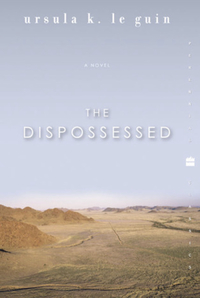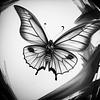Take a photo of a barcode or cover
adventurous
challenging
reflective
slow-paced
Plot or Character Driven:
Character
Strong character development:
Yes
Loveable characters:
Complicated
Diverse cast of characters:
Yes
Flaws of characters a main focus:
Complicated
Shevek comes from the “anarchist” moon of Anarres and visits the planet his people once escaped from, Urras. Urras looks very familiar to us, yet the book is told mostly through Shevek’s eyes, which are familiar only with the culture he grew up in.
It’s a fascinating, heavy book. It takes a while to get into, but once I was in I was captivated. The writing is dense and full of ideas. I don’t think you can get through it without having a new view of things. Le Guin’s writing is, as always, sparse and often beautiful.
It’s a fascinating, heavy book. It takes a while to get into, but once I was in I was captivated. The writing is dense and full of ideas. I don’t think you can get through it without having a new view of things. Le Guin’s writing is, as always, sparse and often beautiful.
adventurous
challenging
reflective
medium-paced
Plot or Character Driven:
Character
Strong character development:
Yes
Loveable characters:
Complicated
Diverse cast of characters:
Yes
Flaws of characters a main focus:
Yes
reflective
slow-paced
Plot or Character Driven:
A mix
Strong character development:
Yes
Loveable characters:
Complicated
Diverse cast of characters:
No
Flaws of characters a main focus:
No
A close contender for my favorite of Le Guin's. Also the only credible example of an anarchist utopia I know of. I've reread this one three times now.
adventurous
challenging
hopeful
inspiring
mysterious
reflective
fast-paced
adventurous
emotional
hopeful
inspiring
reflective
tense
medium-paced
Plot or Character Driven:
A mix
Strong character development:
Yes
Loveable characters:
Yes
Diverse cast of characters:
Yes
Flaws of characters a main focus:
Complicated
adventurous
emotional
hopeful
inspiring
reflective
medium-paced
Plot or Character Driven:
Character
Strong character development:
Yes
Loveable characters:
Yes
Diverse cast of characters:
Yes
Flaws of characters a main focus:
Complicated
My second Ursula K le Guin book. So incredibly well done. How does she do it?? I’ll be thinking about this for a long time. Already excited to reread it sometime
A brutal read. This was perhaps the most difficult book for me emotionally this year. Perhaps because I started it while severely depressed and inside the fugue nature that accompanies chronic illness, my reading was informed by pain. I felt near hope and despair in equal parts through the pages and both felt unbearable. I'm glad that I read this book but it was not easy for me. I'd like to sit with it in a more critical light but I'm suffused first with the feelings I had while reading. It was painful to read; painful not because a perfect utopia does not exist—neither in the novel nor our world—but because hell is here and perpetuated by our hands. In reading Shevek's story, I read our own past and present and wonder with what grasping, fumbling tenacity will we glimpse any future that is the fulfillment of promises made to each other in this kith (to borrow Sophie Lewis' writing regarding what will replace kin) that is Odo's hope. The novel is patient and exacting. Hope is not easy but complicated by cruelty, misunderstanding, possession, violence. In the same breath, loss is not merely tempered—which would be a disservice to a type of wholeness promised of true freedom—but understood temporally as the fulfillment of love and fidelity. I finished with the sentiment that I will return again and again to this book, though I think it has to live in me longer before I can.
"To break a promise is to deny the reality of the past. Therefore, it is to deny the hope of a real future. If time and reason are functions of each other, if we’re creatures of time, then we had better know it, and try to make the best of it. To act responsibly."
challenging
dark
emotional
hopeful
informative
reflective
sad
tense
slow-paced
This book should be required reading in school.
adventurous
mysterious
medium-paced





